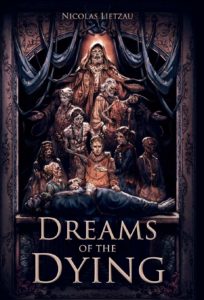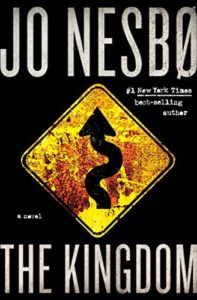Winter is coming (or perhaps, metaphorically, is already here), and whether you’re looking to embrace the cold through Northern noir or warm up with with fiction from the Global South, November’s international crime releases are here to serve. November brings new releases from Scandinavian favorites and bold new voices from Latin America, with a savage French comedy and a German game designer’s first novel to round things out.

Kjell Erikson, The Night of the Fire (Minotaur)
It is a sacred truth of detective fiction that, should a police detective choose to retire to a small rural town in the hopes of finally finding some peace, they will inevitably stumble upon a body the moment they arrive. In The Night of the Fire, things don’t happen quite so quickly, but former inspector Ann Lindell doesn’t have long to devote herself to artisanal cheese making in her new home in the countryside before she’s drawn into a local arson case after a school being used for refugee housing is burned down, leaving three people dead. Lindell’s small town case also seems to be connected to a much larger set of attacks planned in the Swedish capital. Guess she picked the wrong week to stop smoking cigarettes solving crimes.
Pascal Garnier, How’s the Pain? (Gallic)
Translated by Emily Boyce
An aging ratcatcher is after a different kind of vermin when he takes off on a road trip, escorted by his naive driver to the site of many a soon-to-be crime scene. Pascal Garnier’s sardonic wit and bizarre acts of violence against his character evoke the best of Simenon and the hard-boiled writers of the 1950s. Previously issued in 2011, How’s the Pain is back with a new cover design as part of Gallic’s ongoing effort to get Garnier a bit more respect among the English-reading world.
Dolores Reyes, Eartheater (Harpervia)
Translated by Julia Sanches
This book is so cool. In nowhere, Argentina, a young woman feels an aching compulsion to stuff herself with dirt, an act that delivers her the power to locate the murdered and missing. Friends and family are disturbed by her powers, but a steady trickle of clients bearing dirt converge on her small home, looking to find their loved ones. Punk noir meets surrealism and ancient folklore for a work unlike any other. (And its small size makes it far easier to devour than the main character’s fistfuls of earth).
Daniel Tunnard, Escapes (Unnamed Press)
In this wild ride through an alternative history version of the 1990s where Scrabble competitions dominate the sports airwaves, two players must fight for their lives and their beloved game against the Scrabble Mafia (termed, as is quite necessary and logical, the Scrafia). Tunnard, a British writer and translator living in Argentina, is himself a Scrabble champion, and Escapes is a delightful romp through language itself.
Nicolas Lietzau, Dreams of the Dying
Lietzau is justly famed for his work on the game Enderal, and now he’s bringing his unique creations and sweeping world-building to the page in Dreams of the Dying, the first of a trilogy set in the world of the celebrated game. An ex-mercenary accepts a mysterious invitation to an island kingdom beset by rivalries and in danger of collapse. He’s soon drafted to investigate an attack on the kingdom’s ruler, and must venture into the dangerous society around him (and into the king’s mind) to find the truth and battle the demons of his own psyche.
Julián Herbert, Bring Me The Head of Quentin Tarantino (Graywolf)
The stories in Julian Herbert’s new collection are not so much crime stories, as tales of violence. Combining the comical and cringeworthy, the macabre and the bizarre, Herbert sends his readers on a surreal journey through a modern-day Mexico beset by violence and desperately holding on to what sanity is left in a crazed world. The title story is particularly amazing, featuring a cartel lord who’s convinced that Quentin Tarantino is his doppelgänger, and holds a film critic hostage in order to explain why.
Jo Nesbø, The Kingdom (Knopf)
Translated by Robert Ferguson
The dark prince of Norwegian crime fiction returns to noir in The Kingdom, a family saga that explores all the tensions and contradictions of modern Scandinavian society. In this tale of two brothers, one has never left the small mountain town of their childhood, but the other has traveled far and wide before he returns as a developer, making big promises that seem hard to keep. As disputes over the town’s future grow, its darkest secrets begin to emerge. Minimal, moody, and murderous, The Kingdom showcases Nesbo at his bleakest best.























